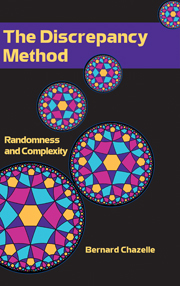Book contents
- Frontmatter
- Contents
- Preface
- 1 Combinatorial Discrepancy
- 2 Upper Bound Techniques
- 3 Lower Bound Techniques
- 4 Sampling
- 5 Geometric Searching
- 6 Complexity Lower Bounds
- 7 Convex Hulls and Voronoi Diagrams
- 8 Linear Programming and Extensions
- 9 Pseudorandomness
- 10 Communication Complexity
- 11 Minimum Spanning Trees
- A Probability Theory
- B Harmonic Analysis
- C Convex Geometry
- Bibliography
- Index
2 - Upper Bound Techniques
Published online by Cambridge University Press: 05 October 2013
- Frontmatter
- Contents
- Preface
- 1 Combinatorial Discrepancy
- 2 Upper Bound Techniques
- 3 Lower Bound Techniques
- 4 Sampling
- 5 Geometric Searching
- 6 Complexity Lower Bounds
- 7 Convex Hulls and Voronoi Diagrams
- 8 Linear Programming and Extensions
- 9 Pseudorandomness
- 10 Communication Complexity
- 11 Minimum Spanning Trees
- A Probability Theory
- B Harmonic Analysis
- C Convex Geometry
- Bibliography
- Index
Summary
Be examine several methods for constructing low-discrepancy point sets. To motivate our discussion, in §2.1 we briefly mention a classical application of discrepancy theory to numerical integration. We introduce the Halton-Hammersley point sets in §2.2 and derive upper bounds on the L∞ norm of the discrepancy of axis-parallel boxes. We tackle the L2 norm of the two-dimensional case in §2.3, which leads us to studying the low-discrepancy properties of certain arithmetic progressions modulo 1. This is related to the infinite motion of a billiard ball in a square pool table.
In §2.4 we examine the discrepancy of boxes that are free to be both translated and rotated. We give a simple probabilistic construction, called jittered sampling, which comes close to being optimal. This construction and some close variants of it are popular in computer graphics for solving antialiasing problems.
In §2.5 we consider the problem of placing points on a sphere as “uniformly” as possible. This is a classical problem arising in quadrature, coding theory, tomography, etc. We describe a group-theoretic construction that produces low-discrepancy point sets (especially for integration and, to a lesser extent, for spherical caps). The generation of points is as extraordinarily simple as its analysis is mathematically deep and far-reaching. If you ever harbored any doubt about the unity of mathematics, this is required reading. You will witness all branches of mathematics coming together in spectacular fashion.
- Type
- Chapter
- Information
- The Discrepancy MethodRandomness and Complexity, pp. 41 - 132Publisher: Cambridge University PressPrint publication year: 2000



